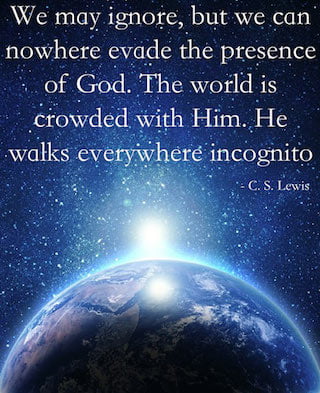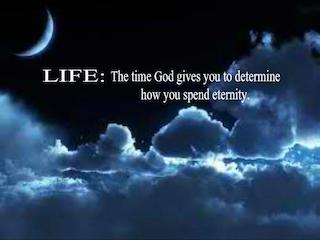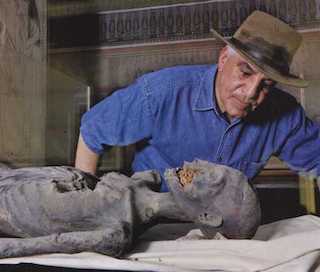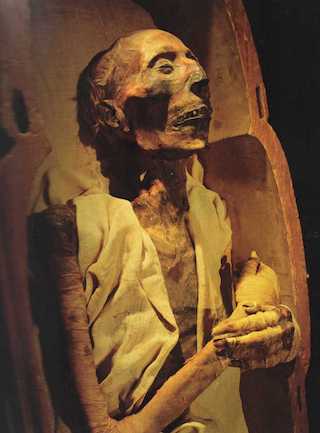 The people back then weren’t completely wrong, there is an afterlife, but we have no idea what that is going to be like. Yet, we know it’s going to be great because You said so.
The people back then weren’t completely wrong, there is an afterlife, but we have no idea what that is going to be like. Yet, we know it’s going to be great because You said so.
“But as it is written, Eye hath not seen, nor ear heard, neither have entered into the heart of man, the things which God hath prepared for them that love him” (1 Cor 2:9).
“For since the beginning of the world men have not heard, nor perceived by the ear, neither hath the eye seen, O God, beside thee, what he hath prepared for him that waiteth for him” (Is 64:4).
“For God so loved the world, that he gave his only begotten Son, that whosoever believeth in him should not perish, but have everlasting life” (Jn 3:16).
“And this is the will of him that sent me, that everyone which seeth the Son, and believeth on him, may have everlasting life: and I will raise him up at the last day” (Jn 6:40).
“For whosoever shall call upon the name of the Lord shall be saved” (Rom 10:13).
“And these shall go away into everlasting punishment: but the righteous into life eternal” (Matt 25:46).
“Now faith is the substance of things hoped for, the evidence of things not seen (Heb 11:1).
 Those that don’t believe their afterlife will be in hell forever.
Those that don’t believe their afterlife will be in hell forever.
“And many of them that sleep in the dust of the earth shall awake, some to everlasting life, and some to shame [and] everlasting contempt” (Dan 12:2).
“Enter ye in at the strait gate: for wide is the gate, and broad is the way, that leadeth to destruction, and many there be which to in thereat” (Matt 7:13).
“But the fearful, and unbelieving, and the abominable, and murderers, and whoremongers, and sorcerers, and idolaters, and all liars, shall have their part in the lake which burneth with fire and brimstone: which is the second death” (Rev 21:8).
The Bible mentions locusts in quite a few places, like Ex 10:13 and Rev 9:3, so let’s look at…
Joel 1
The Plague of Insects
1 The word of the LORD that came to Joel the son of Pethuel.
“Joel” – means “The LORD is God”; cf. Elijah’s name, which means “(My) God is the LORD.”
2 Hear this, ye old men, and give ear, all ye inhabitants of the land. Hath this been in your days, or even in the days of your fathers?
3 Tell ye your children of it, and let your children tell their children, and their children another generation.
4 That which the palmerworm hath left hath the locust eaten; and that which the locust hath left hath the cankerworm eaten; and that which the cankerworm hath left hath the caterpiller eaten.
5 Awake, ye drunkards, and weep; and howl, all ye drinkers of wine, because of the new wine; for it is cut off from your mouth.
6 For a nation is come up upon my land, strong, and without number, whose teeth are the teeth of a lion, and he hath the cheek teeth of a great lion.
The locusts are compared here to a nation; cf. the ants and conies in Prov 30:25-26. Elsewhere they are called the Lord’s “army”. The reverse comparison – that of armies to locusts in regard to numbers – is as old as Ugartic literature (15th century B.C.; and is common in the Old Testament.
7 He hath laid my vine waste, and barked my fig tree: he hath made it clean bare, and cast it away; the branches thereof are made white.

8 Lament like a virgin girded with sackcloth for the husband of her youth.
“Virgin” – the community is addressed. In Israel, when a woman was pledged to be married to a man, he was called her husband and she his wife, thought she was still a virgin (Deut 22:23-24). The verse refers to such a husband who died before the marriage was consummated.
9 The meat offering and the drink offering is cut off from the house of the LORD; the priests, the LORD’S ministers, mourn.
“Offering” – the locusts have left nothing that can be offered as sacrifice. The grain offering and the drink offering, which was a libation of wine were part of the daily offering.
10 The field is wasted, the land mourneth; for the corn is wasted: the new wine is dried up, the oil languisheth.
“New wine…oil” – an important Old Testament triad, related to the agriculture of that day.
11 Be ye ashamed, O ye husbandmen; howl, O ye vinedressers, for the wheat and for the barley; because the harvest of the field is perished.
12 The vine is dried up, and the fig tree languisheth; the pomegranate tree, the palm tree also, and the apple tree, even all the trees of the field, are withered: because joy is withered away from the sons of men.
13 Gird yourselves, and lament, ye priests: howl, ye ministers of the altar: come, lie all night in sackcloth, ye ministers of my God: for the meat offering and the drink offering is withholden from the house of your God.

14 Sanctify ye a fast, call a solemn assembly, gather the elders and all the inhabitants of the land into the house of the LORD your God, and cry unto the LORD,
“Fast…assembly” – fasting, required on the Day of Atonement and also practical in times of calamity was sign of penitence and humility. The Bible speaks against outward signs that do not reflect a corresponding inward belief or attitude.
15 Alas for the day! For the day of the LORD is at hand, and as a destruction from the Almighty shall it come.
“Day of the LORD” – sometimes abbreviated as “That day,” the term often refers to the decisive intervention of God in history, such as through the invasion of locusts in Joel or at the battle of Carchemish, 605 B.C.
It can also refer to Christ’s coming to consummate history. When the term is not used for divine judgments in the midst of history, it refers to the final day of the Lord, which generally has two aspects:
1. God’s triumph over and punishment of His enemies and
2. His granting of rest (security) and blessing to His people.
16 Is not the meat cut off before our eyes, yea, joy and gladness from the house of our God?
 17 The seed is rotten under their clods, the garners are laid desolate, the barns are broken down; for the corn is withered.
17 The seed is rotten under their clods, the garners are laid desolate, the barns are broken down; for the corn is withered.
18 How do the beasts groan! The herds of cattle are perplexed, because they have no pasture; yea, the flocks of sheep are made desolate.
19 O LORD, to thee will I cry: for the fire hath devoured the pastures of the wilderness, and the flame hath burned all the trees of the field.
1:19-20 – “Fire” – although the destruction caused by the locusts is elsewhere compared to that of a fire, here the prophet likely is describing the effects of a drought. In both cases he evokes the fire of God’s judgment.
20 The beasts of the field cry also unto thee: for the rivers of waters are dried up, and the fire hath devoured the pastures of the wilderness.
Mummies
The earliest ancient Egyptians buried their dead in small pits in the desert, as old as 3500 B.C., if not older. The heat and dryness of the sand dehydrated the bodies quickly, creating lifelike and natural “mummies”.
Later, the ancient Egyptians began burying their dead in coffins to protect them from wild animals in the desert. However, they realized that bodies placed in coffins decayed when they were not exposed to the hot, dry sand of the desert.
Over many centuries, the ancient Egyptians developed a method of preserving bodies so they would remain lifelike. Today we call this process mummification.
Mummification was not performed to comfort the family and friends of the deceased, as embalmers do today when they preserve a body for viewing and burial.
Its purpose was to provide a lasting home for the immortal soul of the deceased, which would embark on heavenly journeys, then return to the entombed body for nourishment in the form of real or symbolic offerings of food and drink.
Mummification was a sacred task, performed by priests, who first removed the perishable internal organs and placed them in a vessel called a canopic jar that would be buried with the mummy. hey then dried and preserved the body using a salt called natron, swathed it in fragrant oil, coated it with resin, and wrapped it in linen.
hey then dried and preserved the body using a salt called natron, swathed it in fragrant oil, coated it with resin, and wrapped it in linen.
Coffins and the walls of tombs were inscribed with spells, or sacred texts, which helped ensure that the deceased would achieve immortality and sail across heaven in spirit with the sun god Re. “I shall sail rightly in my bark,” proclaimed one text. “I am lord of eternity in the crossing of the sky.”
…Locusts in the Ancient Near East.
Visits: 0

